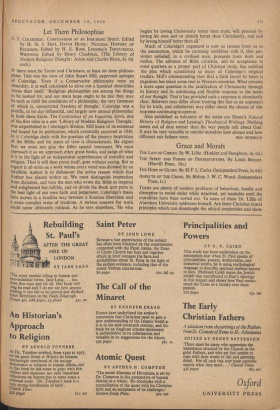Let Them Philosophise
117 there must. be Tories and Christians, at least let them philoso- phise. This was the view of John Stuart Mill, expressed apropos of Coleridge. 'Even if a Conservative philosophy were an absurdity, it is well calculated to drive out a hundred absurdities worse than itself.' Religious philosophies are among the things to be looked for, and our main hope ought to be that they may be such as fulfil the conditions of a philosophy, the very foremost of which is, unrestricted freedom of thought.' Coleridge was a Prolific, in his day influential, and largely now unread philosopher in both these kinds. The Confessions of an Inquiring Spirit, one of the first titles in a new 'Library of Modern Religious Thought,' was unpublished in Coleridge's lifetime. Mill knew of its existence and hoped for its publication, which eventually occurred in 1840. In it Coleridge deals with the question of the plenary inspiration of the Bible; and his point of view is characteristic. He argues that we must not give the Bible special treatment. We must approach it as we approach other great books, and judge of what it is in the light of an independent apprehension of morality and religion. That it will then prove itself, goes without saying. But to regard it ab initio as a work whose every word was dictated by an infallible Author is to dishonour the active reason which that Author has placed within us. We must distinguish inspiration from dictation, and view the men who wrote the Bible as inspired and enlightened but fallible, and so divide the Book into parts in the best light of our own faith and judgement. Coleridge's thesis here moves in a familiar way between a Kantian liberalism and a more complex sense of tradition. A serious concern for truth could never ultimately mislead. As he says elsewhere, 'He who begins by loving Christianity better than truth, will proceed by loving his own sect or church better than Christianity, and end by loving himself better than all.'
Much of Coleridge's argument is now as remote from us as the. assumption, which he curiously combines with it, that per- sistent unbelief, in a civilised man, proceeds from sloth and malice. The advance of Bible criticism, and its acceptance in most quarters as a proper part of Christian study, has satisfied the plea which scandalised so many of Coleridge's original readers. Mill's corresponding view that a faith learnt by heart is paganism has taken some root in Western countries. What remains a more open question is the justification of Christianity through its history and its continuing and flexible response to the needs of our thought. That it has provided such a response is abundantly clear. Believers may differ about treating this fact as an argument for its truth, and unbelievers may differ about the chance of this response continuing to operate.
Also published as initiators of the series are Hume's Natural History of Religion and Lessing's Theological Writings. Nothing seems out of date sooner than the way people talk about God. It may be very valuable to remind ourselves how distant and how










































 Previous page
Previous page